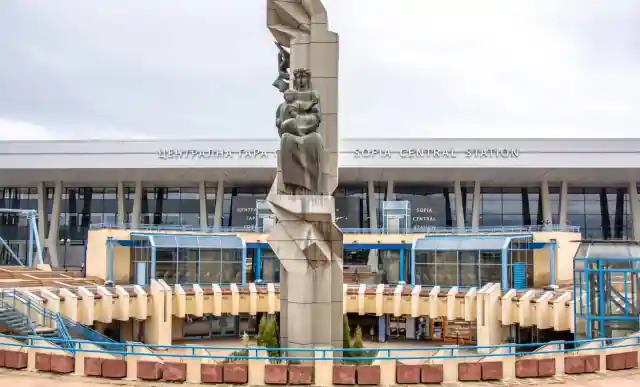
Sofia, Bulgaria — A train collision at Sofia Central Station on Tuesday afternoon resulted in minor injuries to six people and caused significant service disruptions.
Transport Minister Georgi Gvozdeikov confirmed that the incident occurred around 4:40 PM when a stationary train bound for Plovdiv was struck from behind by another train performing a maneuver with three carriages.
The minister emphasized that there was no head-on collision, as initially reported, and that the accident was due to the maneuvering train’s driver falling ill and failing to stop in time.
The low-speed collision caused damage to the rear carriage of the stationary train. Gvozdeikov assured that the incident was not related to any infrastructure issues but was solely due to human error.
Six individuals sustained minor injuries and were promptly transported to hospitals for treatment. Among the injured, two men were taken to “Pirogov” hospital, one to ISUL, and another to VMA, with none of the injuries being life-threatening.
One man suffered a broken arm. Additionally, eight other individuals, comprising four men and four women, were assessed at the scene and did not require hospitalization.
The collision has significantly impacted train schedules, particularly for the Sofia-Burgas and Sofia-Plovdiv routes.
Both fast trains were halted at Sofia Central Station, affecting the scheduled departures for the Plovdiv-bound train at 4:20 PM and the Burgas-bound train at 4:40 PM.
Furthermore, the passenger train bound for Sofia-Ihtiman experienced a delay, running 23 minutes behind schedule due to delays at the Poduyane Patnicheska station.
Earlier reports had suggested a more severe collision with at least four individuals injured, but these were later clarified by official statements.
The Bulgarian State Railways “Passenger Transport” confirmed the disruptions, emphasizing their efforts to manage the situation and provide timely information to passengers.
Adding to the day’s challenges, Sofia Central Station experienced a significant technical malfunction earlier in the day.
A temporary route-computer centralization system failure around 7:10 PM on Monday evening caused widespread disruptions, with several trains canceled and others delayed by 40 to 120 minutes.
The issue was resolved by 10:30 PM, but the backlog and delays carried over into Tuesday’s operations.
The modernization efforts at Sofia Central Station, which began on May 7, have contributed to the complexity of managing train operations.
The construction work involves dismantling seven tracks and contact networks, leading to a congested and challenging environment for train maneuvers and scheduling.
Despite these setbacks, Transport Minister Gvozdeikov expressed confidence in the ongoing improvements at the station and assured the public that safety remains a top priority.
“We are working diligently to enhance the infrastructure and ensure such incidents are minimized in the future,” he stated.
Passengers affected by the delays and cancellations were informed through the station’s voice system and were advised to consider alternative transportation options.
The Transport Ministry and Bulgarian State Railways are committed to restoring normal service as quickly as possible while continuing the essential modernization work at Sofia Central Station.
As investigations into the collision continue, authorities are focused on ensuring accountability and preventing similar incidents.
The driver of the maneuvering train is expected to face an inquiry to determine the full circumstances that led to the collision. Meanwhile, the passengers’ safety and timely travel remain the primary concerns of the railway authorities.
